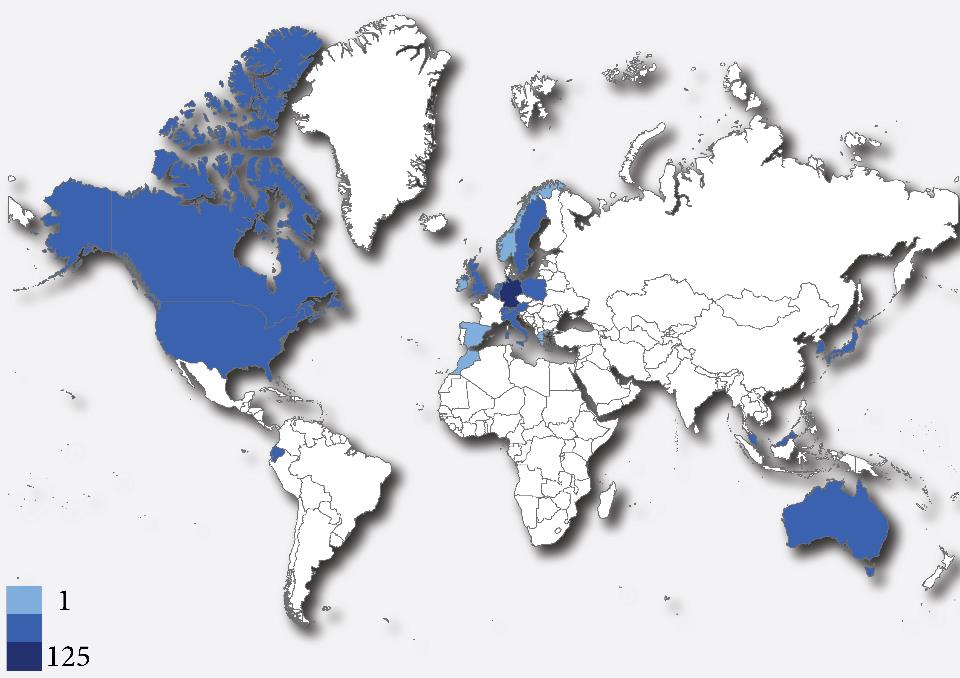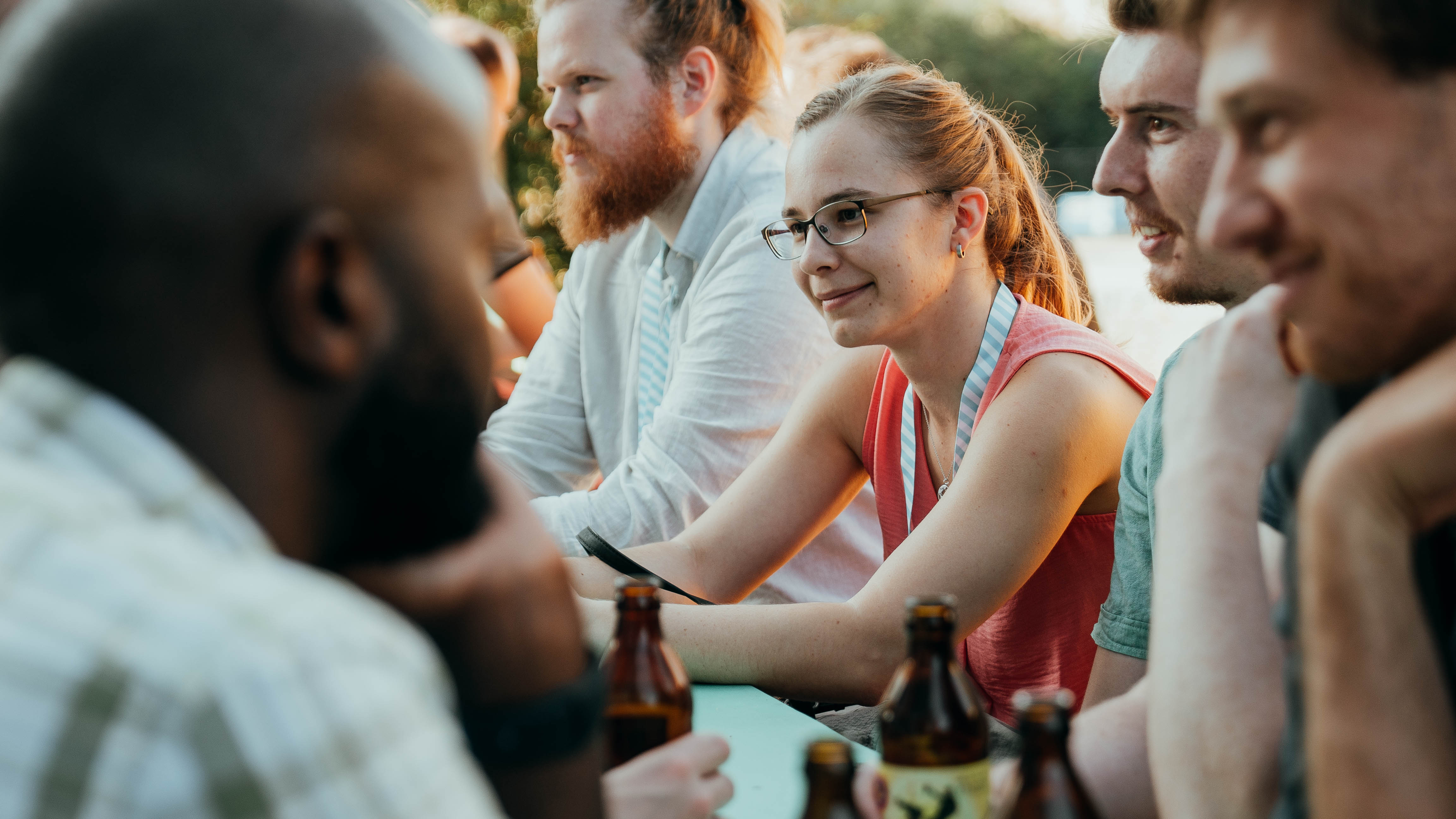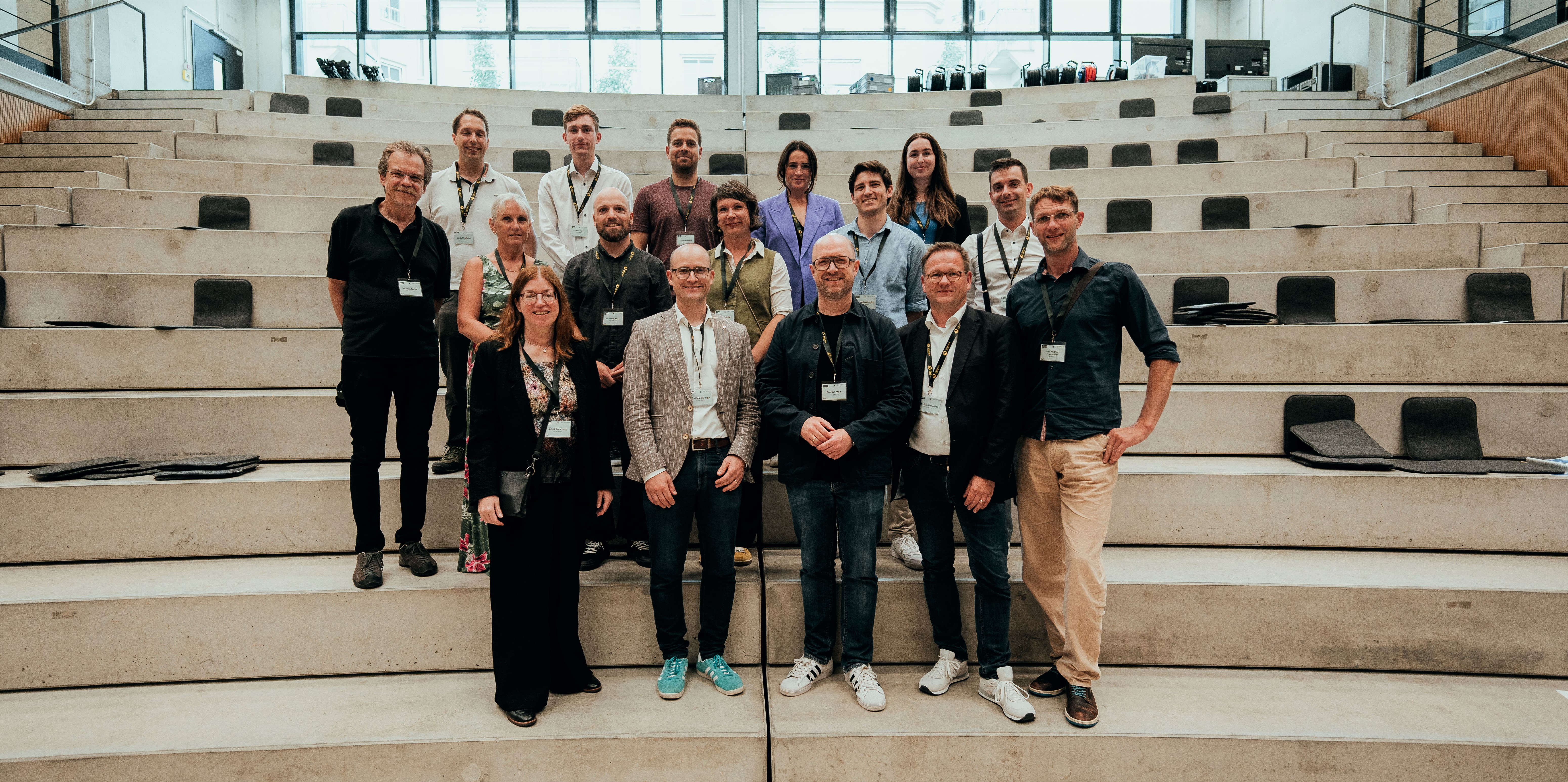International Forum on Urban Digital Twins
Ein Rückblick auf das International Forum im Munich Urban Colab im September 2023: Alles rund um das Thema Urbane Digitale Zwillinge.
Eine Keynote, sieben Präsentationen, ein Barcamp und vieles mehr
Das war das International Forum on Urban Digital Twins am 12. September 2023 im Munich Urban Colab. Im Rahmen der Konferenz 3DGeoInfo vom 12. bis 14. September wurde das Event von der Landeshauptstadt München in Zusammenarbeit mit der Technischen Universität München organisiert. Ein Rückblick auf das International Forum im Munich Urban Colab.
Veranstaltung im Munich Urban Colab

“Lots of people talk about the potential of Digital Twins, but not many talk about the challenges.” (Filip Biljecki, National University of Singapore und Teilnehmender der Veranstaltung). Nicht zuletzt unter diesem Motto haben sich auf Einladung des GeodatenService München in Gemeinschaft mit der TU München über 200 internationale Teilnehmende im Munich Urban Colab getroffen. Die Veranstaltung war bis auf den letzten Platz ausgebucht und ermöglichte einen interaktiven Austausch zum Thema Urbane Digitale Zwillinge für Expert*innen und interessierte Gäste aus Städten und Kommunen, Forschung und Wirtschaft aus aller Welt. Auf der Grafik ist zu sehen, aus welchen Teilen der Welt die Gäste für das International Forum angereist waren.
„Before the conference, the International Forum on Urban Digital Twins was organised. A presentation by Jens Bartholmes from the European Commission was the keynote, next to many others from local governments (Barcelona, Helsinki, Munich, Utrecht, etc.), which were really cool. European tax payers - rest assured that your money is going into good stuff, at least when it comes to digital twins and 3D.“
(Filip Biljecki, National University of Singapore)
Eröffnet wurde das International Forum von Edwin Grodeke, Stellvertreter von Kommunalreferentin Kristina Frank, und Professor Thomas Kolbe vom Lehrstuhl für Geoinformatik der TU München. In seiner Begrüßungsrede hob Grodeke die Wichtigkeit der Kooperation der Stadt mit der TU München sowie das Thema Urbane Digitale Zwillinge in München hervor. Auch betonte er die besondere Relevanz des Projekts ASCEND, welches von der Europäischen Union gefördert wird. Gemeinsam mit über 40 Partner*innen der Wissenschaft, Wirtschaft und Verwaltung aus 14 europäischen Ländern arbeitet die Landeshauptstadt München an energiepositiven Quartieren in den beteiligten Städten.
"Der Ansatz des Urbanen Digitalen Zwillings als digitales Abbild der Stadt für Analysen, Simulationen und Was-Wäre-Wenn-Szenarien ist in den Städten und Kommunen angekommen. Die Landeshauptstadt München nimmt dabei auf internationaler Ebene eine Vorreiterrolle ein. Das Besondere ist aber, dass der GeodatenService München durch seine Aufgabe für die Entstehung der Daten unmittelbar zuständig ist und dadurch den gesamten Prozess von der Datengewinnung bis hin zum Digitalen Zwilling verantwortet.“
(Edwin Grodeke, Landeshauptstadt München)
Im Anschluss startete der Tag mit einer Keynote von Dr. Ing. Jens Bartholmes, Policy Officer bei der Europäischen Kommission zum Thema „Positive Clean Energy District Digital Twins in the European Context“. Einleitend begann er mit der Fragestellung wie Urbane Digitale Zwillinge die Wandlung von Stadtteilen und ganzer Städte bis hin zur Klimaneutralität unterstützen und die Stadtentwicklung fördern können.
Präsentationen rund um das Thema Urbane Digitale Zwillinge
Es folgten sieben Präsentationen internationaler und nationaler Speaker zu verschiedenen Themen rund um Urbane Digitale Zwillinge:
- „Journey from Data for the Public Good to Credo“ - Sarah Hayes, CReDo, Connected Places Catapult, UK
- „Helsinki 3D Story, city models – open services – use cases“ - Jarmo Suomisto, City of Helsinki Bei Interesse an der Präsentation kontaktieren Sie bitte das Team des Digitalen Zwillings München
- „Digital Twin Munich: Digital Infrastructure of the Climate-Neutral City“ - Mandana Moshrefzadeh, City of Munich
- „Netherlands 3D – open code, open data platform“ - Arjan Koelewijn and Marcel Duffhuis, City of Utrecht
- „Urban Digital Twin: How to fit a Chameleon into a Standard?“ - Joachim Schonowski, DIN
- „Digital Twin: the Future of Urban Planning“ - Jordi Ortuño Ribé and Patricio Reyes, City of Barcelona
- „Key Elements of Urban Digital Twins“ - Prof. Dr. Thomas H. Kolbe, Technical University of Munich
Barcamp
„I really enjoyed the day and the opportunity to speak to different people and find out what’s going in Europe. I think it was an excellent event with a fantastic set of enthusiastic people joining it which always makes the difference! For me, it was very insightful to learn first hand what’s going on across different European countries and I hope it was useful to share our learnings from CReDo.”
(Sarah Hayes, CReDo, Connected Places Catapult, UK)
Nach der Mittagspause startete das Barcamp. Es wurden Sessions zu unterschiedlichsten Themen aufgerufen und so konnten die Teilnehmenden nach persönlichen Präferenzen in die Räume des Munich Urban Colabs ausschwärmen. Insgesamt wurden 13 verschiedene Themen bzw. Fragestellungen präsentiert, gebrainstormt und diskutiert. So kam ein intensiver und persönlicher Austausch zustande.
Die Ergebnisse zu den jeweiligen Barcamp Sessions finden sie hier:
Barcamp-Themen
Barcamp, great idea to do a deep dive of the pitch we did in the morning. Thanks Markus and all of the team, for a great event in a magnificent city, with so many lovely people.
Get-Together

In dem abschließenden Get-Together gab es die Möglichkeit sich bei Focaccia und kühlen Getränken untereinander zu vernetzen sowie die Themen aus den Präsentationen und Barcamp Sessions weiter zu vertiefen.Die Veranstaltung hat gezeigt, wie groß das Interesse an Urbanen Digitalen Zwillingen ist, welche Bedeutung sie für die Städte, die Forschung und auch die Firmen einnehmen. Dabei ist der Austausch untereinander und miteinander von enormer Bedeutung.
Das Organisationsteam

Ein herzliches Dankeschön an alle Speaker, Teilnehmenden und Moderatorin Melitta Varlam. Vielen Dank an das gesamte Organisationsteam und die TU München für die erfolgreiche Zusammenarbeit!
Ein Beitrag von:
Markus Mohl,
GeodatenService München, Landeshauptstadt München
Eva Herrmann,
Externe Beraterin von CGI, GeodatenService München, Landeshauptstadt München


